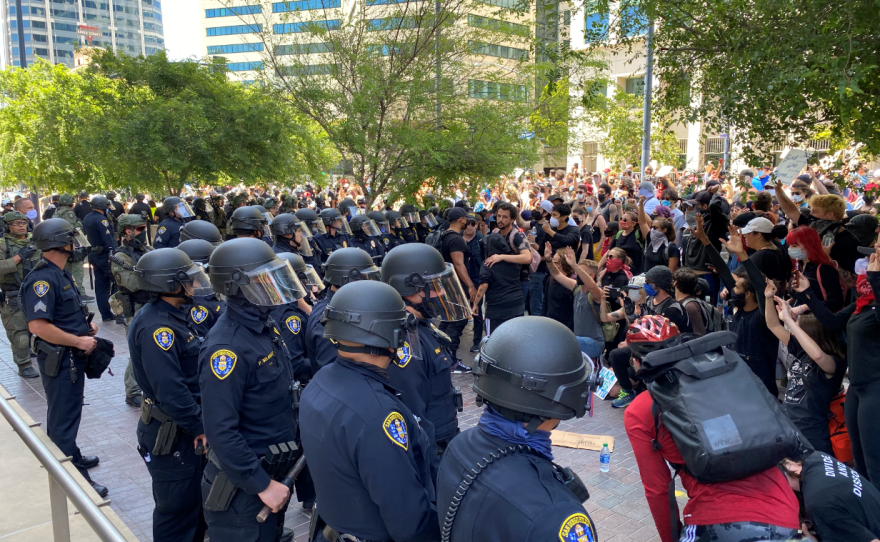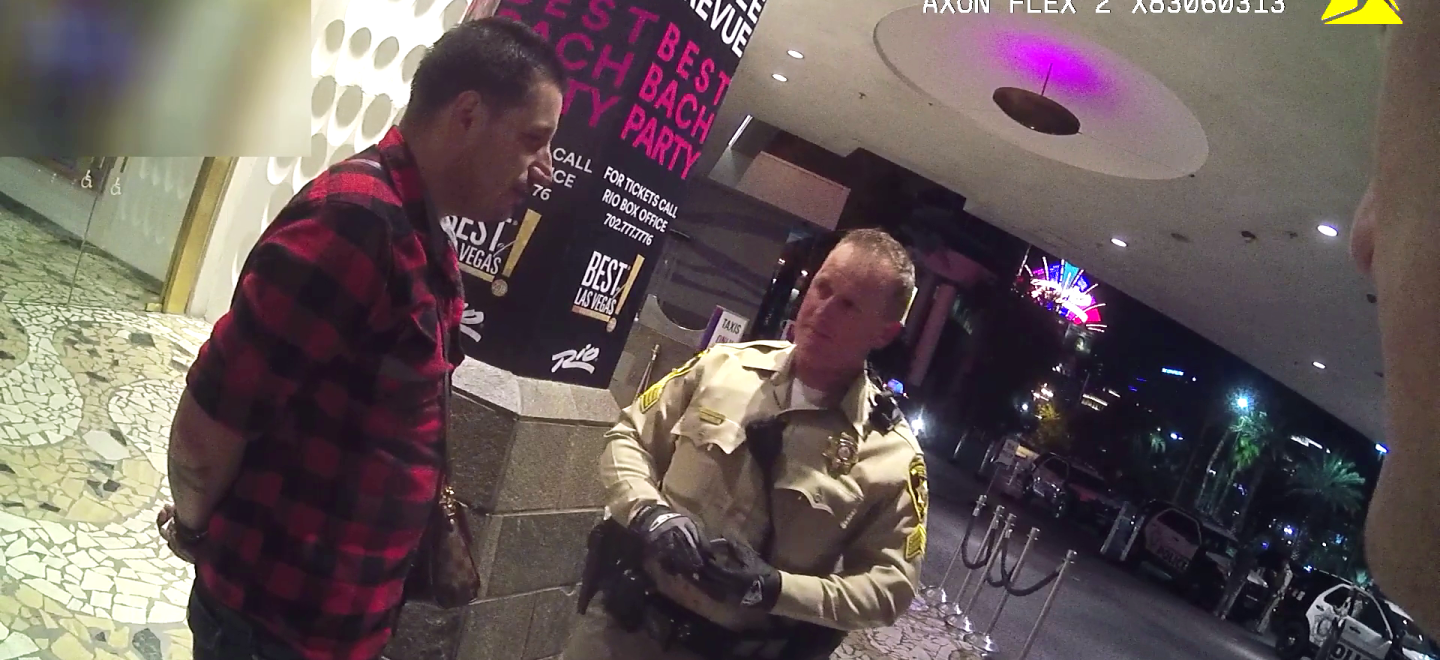In January 2020, San Diego County Sheriff’s Deputy Andrew Phillips took a trip to Las Vegas with his girlfriend and stayed at the Rio Hotel & Casino. Not long after checking in, the couple was on the casino floor drinking vodka tonics.
They befriended a group of German tourists and ended up in their room. “Everyone was being super flirtatious with each other and all that,” Phillips later told Sheriff’s investigators. “We were like, well, you know, they're cute girls. I guess (the German man) was an attractive looking guy and was like, well, let's go upstairs and see where it goes.”
In the room, they took shots—Phillips' girlfriend told investigators she lost count of how many—and kept drinking mixed drinks. Later, Phillips got angry and lost control, allegedly punching a hole in the wall and pointing a gun at someone, according to a Sheriff’s Department Internal Affairs report.
Las Vegas police were called to the scene and officers arrested Phillips, even though he tried to talk them into letting him go because he was a fellow member of law enforcement, the report said. Neither Phillips nor his attorney responded to requests for comment.
Phillips was eventually fired from the Sheriff’s Department for breaking several rules, including drinking while being armed with a gun and attempting to use his position in law enforcement to avoid arrest.
But all of his actions would have been kept from the public if he hadn’t broken one other rule. While being arrested, Phillips made discriminatory comments to police about the Germans.
“F****** Russians," he said. “These freakin' German idiots ... Russian, German, whatever the hell they are. They were speaking some other damn language … Russians come to our country, cause shit, I'm the one who gets in trouble.”
Those comments violated the department’s anti-discrimination policy. And, thanks to a state law signed by Gov. Gavin Newsom in 2021, records from the internal affairs investigation were made public.
The law, SB 16, requires law enforcement agencies to make public all past and future records of sustained findings of discrimination. But since the law went into effect at the beginning of the year, the Phillips case is one of just eight released by police agencies in San Diego County.
The San Diego Harbor Police and Carlsbad, Coronado, El Cajon and Escondido police departments all say they have none, while police officials in Chula Vista and National City say they likely have none but are still searching. The San Diego Police Department has taken an extension and officials say they will produce records by the end of the year.
Meanwhile, the Oceanside Police Department has produced one past record, and the Sheriff’s Department has produced seven. Most of those records relate to sexism or sexual harassment, but not racial discrimination.
Where are all the cases?
State Sen. Nancy Skinner (D-Berkeley) wrote the law and says she’s dubious that agencies have so few discrimination reports. She said one reason could be that their internal affairs departments don’t do thorough reviews.
“If you have a culture in an agency where they, number one, don't even want to recognize misconduct, if the officer is behaving in the way I described, they don't sustain a finding, then that doesn't serve us,” Skinner said.
Another reason for the paltry number of discrimination reports is the reality that police officers are often reluctant to file complaints against each other, say those who’ve experienced discrimination.
A retired Sheriff’s sergeant, who is a minority, told KPBS that when she worked for the department her supervisor “was very macho” and told her not to complain if anyone said negative things to her. She asked to remain anonymous so she wouldn’t face retaliation.
“I had a pep talk where if I had any complaints about the guys saying any bad words or anything offensive, that wasn't the time not to come to him in his office,” she said. “A lot of times people don't like saying anything because you got to always worry about what's going to happen when you say something.”

Former Sheriff’s Detective Stacey Ralph, who is now suing the department for sexual harassment she says she experienced, describes a culture within the department that makes people scared to report.
“I mean, I was scared to report it because I didn't want to be known as the weak female or the quote unquote snitch or rat or whatever,” Ralph said. “I think there's this fear of reporting because then everybody looks at you like, ‘Oh, I can't work with that person because they're a snitch and they can't take jokes.’”
Jenna Rangel, Ralph’s lawyer, said she’s seen other cases in which departments will label the behavior something other than sexual harassment or discrimination in Internal Affairs reports.
“They called it ‘conduct unbecoming,’” she said. “And by labeling it as ‘conduct unbecoming’ instead of ‘sexual harassment,’ they were trying to avoid an admission of liability.”
The fact that when agencies have discrimination findings it’s more likely to be sexism or sexual harassment than racial discrimination was not surprising to Ellen Kirschman, a clinical psychologist who treats first responders including police.
“Because it is such a masculine culture,” she said. “In some agencies, white males are on top, then you've got Black males, and next you have white females and then you have Black women officers and gay male officers at the bottom.”
Leaders of local police agencies reject the notion that a culture of fear prevents proper reporting. Sheriff’s Lt. John Boyce, who runs the department's internal affairs and oversees all investigations, said there’s no disincentive for employees to make a report.
“I can't tell you how much our department reiterates in our employee trainings that they always should feel comfortable coming forward and submitting complaints to Internal Affairs,” Boyce said.
Police conduct in the community
Discrimination within a department is just part of the problem. There are also the acts of discrimination by officers against members of the community. But in the SB 16 records released so far, there is just one sustained finding of discrimination based on a civilian complaint.
That finding was made by the Sheriff’s Department against Deputy Ronald Halstead. While investigating a hit and run at a Vista high school, Halstead allegedly told a student that Mexicans don’t carry identification cards. Halstead retired before he was punished.
Citizens are sometimes reluctant to file official complaints because they don’t think they will go anywhere, said Yusef Miller, executive director of The North County Equity & Justice Coalition.
“I've had many people say that this officer stopped me, they treated me this way, they said something unfair,” he said. “But I asked them to make a complaint and they're like, ‘oh, that's not going to go anywhere. It's not going to do anything.’”

Miller pointed to findings from San Diego State University researchers showing police were more likely to stop people of color.
“There are good officers who do their job and there are good officers who actually care about what they do, but we need to root out these rogue officers and make sure that they're not harming the community and causing these disparities that we see,” Miller said. “It's up to the (San Diego) police department and the Sheriff’s department to root out these officers."
Research by Rashawn Ray, a senior fellow at The Brookings Institution, backs up Miller’s assertions regarding beliefs among community members that their complaints won’t amount to anything. Ray added that people often avoid going to a police station or talking to law enforcement because they don’t want to disclose information about themselves or fear retaliation.
He said complaints need to meet a specific definition to rise to a sustained finding of discrimination.
“Did an officer not just yell at a person, which a person might consider to be worth a complaint, but what did the officer actually say? Did they use a derogatory word?” Ray said. “Discrimination claims are extremely, extremely hard to prove, and it does oftentimes come down to what a community member said and what a police officer said. And that's the reason why video evidence is so, so important and body worn camera evidence is so important.”
Boyce also said there needs to be evidence to back up a complaint before an investigation can be launched. For example, if a complaint comes in about a traffic stop where a citizen alleges a deputy used a racially insensitive term, Boyce said he will first check the deputy’s body camera.
“I can think of several examples where there's an allegation of some insensitive term being used, and when we review the body camera, we clearly see that it never occurred,” he said. “And a lot of times when we re-contact the complainant regarding their complaint, we present them with the findings of the body camera, and a lot of times they'll recant their complaint after that.”
Boyce said the fact that there are so few findings of discrimination is a sign of progress.
“I would like to think that it just shows that the deputy sheriffs and employees of the San Diego Sheriff's Department are doing their job impartially and doing what we expect of them,” he said.
Ray said if indeed there are very few complaints being documented because officers are not discriminatory, that should be celebrated. But he also said departments should be taking many more steps to ensure their employees are behaving properly. Those include establishing stronger citizen oversight boards that see complaints and represent the community in investigations of what happened, and setting up “good apple protections.”
“The same way that we are creating bad apple databases, we need to ensure that there is state level oversight, independent oversight so that officers who see another officer do something wrong should not simply report it to internal affairs,” he said. “If there's state level oversight, officers can file their complaint with the state and then it can be investigated from there.”











